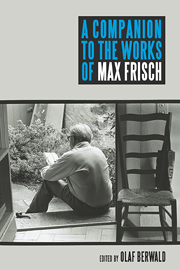Book contents
- Frontmatter
- Contents
- Acknowledgments
- Note on the Abbreviations
- Introduction: Max Frisch in the Twenty-First Century
- 1 Max Frisch's Early Plays
- 2 Spielraum in Max Frisch's Graf Öderland and Don Juan: Transparency as Mode of Performance
- 3 Max Frisch's Biedermann und die Brandstifter and Die große Wut des Philipp Hotz
- 4 Max Frisch's Andorra: Balancing Act between Pattern and Particular
- 5 Eternal Recurrence in Life and Death in Max Frisch's Late Plays
- 6 Max Frisch's Early Fiction
- 7 From Life to Literature: Max Frisch's Tagebücher
- 8 “Writing in order to be a stranger to oneself”: Max Frisch's Stiller
- 9 Cybernetic Flow, Analogy, and Probability in Max Frisch's Homo Faber
- 10 The Ends of Blindness in Max Frisch's Mein Name sei Gantenbein
- 11 Max Frisch's Montauk. Eine Erzählung
- 12 Man, Culture, and Nature in Max Frisch's Der Mensch erscheint im Holozän
- 13 “My life as a man. Everyman”: Max Frisch's Blaubart. Erzählung
- 14 Max Frisch's Essays and Speeches
- Frisch's Major Works
- Select Bibliography
- Notes on the Contributors
- Index
10 - The Ends of Blindness in Max Frisch's Mein Name sei Gantenbein
Published online by Cambridge University Press: 05 December 2013
- Frontmatter
- Contents
- Acknowledgments
- Note on the Abbreviations
- Introduction: Max Frisch in the Twenty-First Century
- 1 Max Frisch's Early Plays
- 2 Spielraum in Max Frisch's Graf Öderland and Don Juan: Transparency as Mode of Performance
- 3 Max Frisch's Biedermann und die Brandstifter and Die große Wut des Philipp Hotz
- 4 Max Frisch's Andorra: Balancing Act between Pattern and Particular
- 5 Eternal Recurrence in Life and Death in Max Frisch's Late Plays
- 6 Max Frisch's Early Fiction
- 7 From Life to Literature: Max Frisch's Tagebücher
- 8 “Writing in order to be a stranger to oneself”: Max Frisch's Stiller
- 9 Cybernetic Flow, Analogy, and Probability in Max Frisch's Homo Faber
- 10 The Ends of Blindness in Max Frisch's Mein Name sei Gantenbein
- 11 Max Frisch's Montauk. Eine Erzählung
- 12 Man, Culture, and Nature in Max Frisch's Der Mensch erscheint im Holozän
- 13 “My life as a man. Everyman”: Max Frisch's Blaubart. Erzählung
- 14 Max Frisch's Essays and Speeches
- Frisch's Major Works
- Select Bibliography
- Notes on the Contributors
- Index
Summary
In an interview published in Die Zeit in 2010, Swiss actor Bruno Ganz, one of the most influential artists in the German-speaking world over the last fifty years, insists on the unreliability and fluid status of personal identity:
Ich halte es nicht für einen allzu gesicherten, fest umrissenen Zustand, der zu sein, der ich bin. Ich denke, Identität besteht aus allen möglichen ungeklärten teilen. Und was ist eigentlich dieses “Ich”? Ich versuche, das fliessend zu halten, weil ich Angst vor festen Grenzen habe. andererseits merke ich schon, dass es so etwas wie “mich” gibt. Oder Dinge, die sich einfach immer wieder ereignen, wenn ich dabei bin.
[I do not consider being who I am a well secured and rigidly defined condition. I believe that identity consists of all kinds of possible unexplained components. And what is this “I” in the first place? I try to keep it fluid because I am afraid of static boundaries. On the other hand I notice that there is something like “me.” Or things that happen time and again when I happen to be around.]
Arguing against a static conception of autobiographical coherence, Ganz, whose early theater career at the Zurich Schauspielhaus had been supported by Frisch when he urged the city of Zurich not to close the Schauspielhaus, puts the fragility of selfhood and a productive fear of fixed boundaries at the heart of self-understanding.
- Type
- Chapter
- Information
- A Companion to the Works of Max Frisch , pp. 156 - 171Publisher: Boydell & BrewerPrint publication year: 2013

